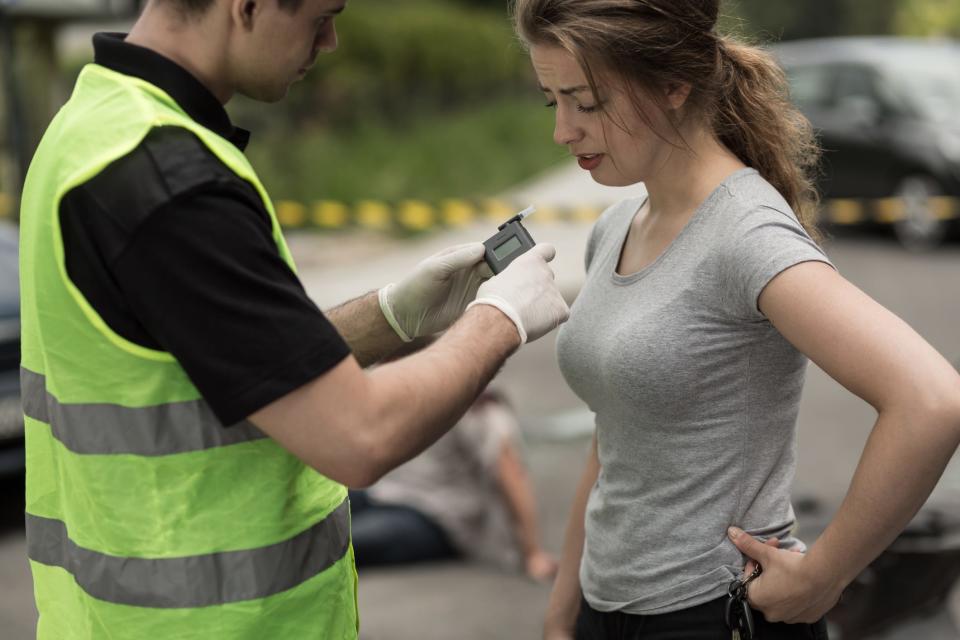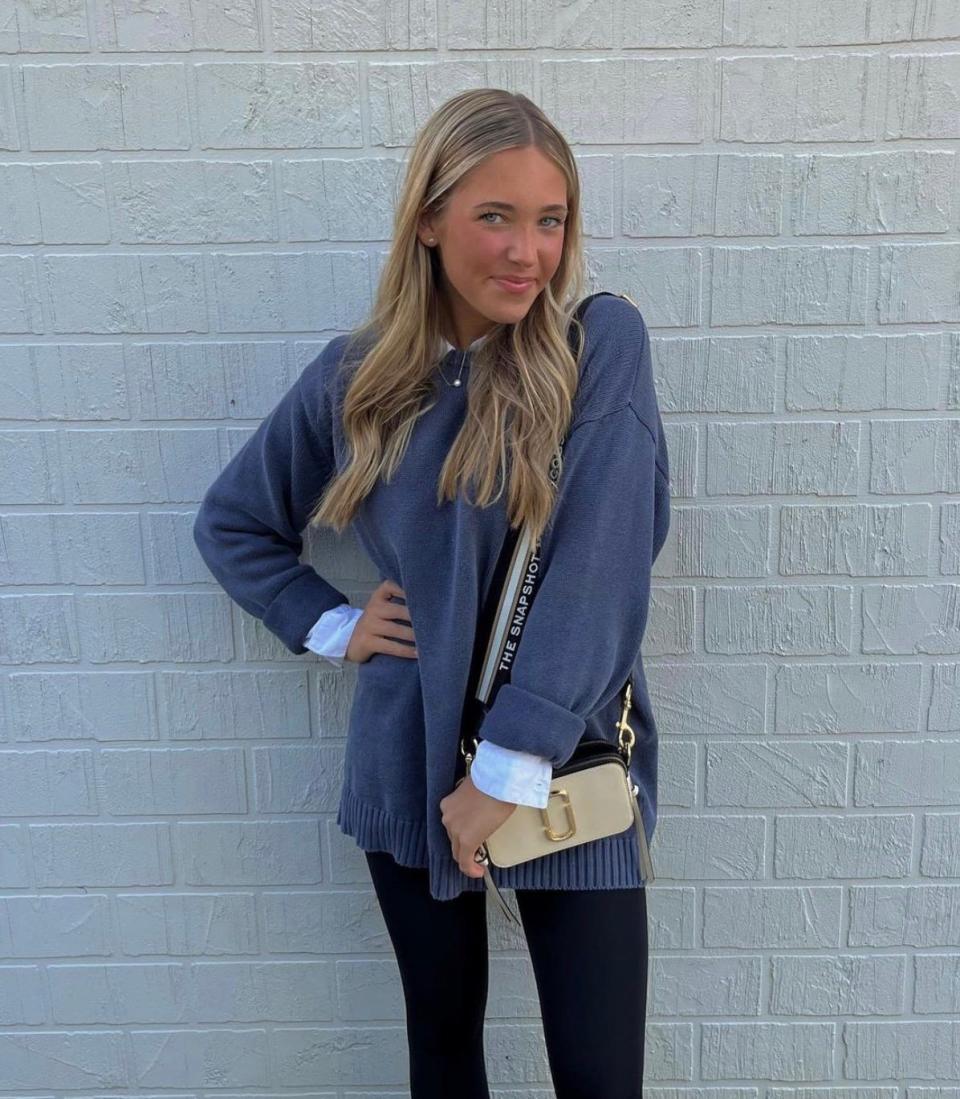This year's prom may mean a dress, a tux, and a Breathalyzer. Are we OK with that?

Jenna Hesher spent months shopping online for the perfect prom dress. She ordered six, only to return them, before settling on a simple, straight-cut red-and-pink number. She plans to wear gold heels and accents, a flawless, classy look.
Hesher, 18, is a Westfield High School senior. She's excited for all the pomp and pageantry that comes with the dawn of independent adulthood.
This year's prom theme, centered on that right-of-passage is: "Written in the Stars."
And right as Hesher walks in the door of the downtown Indianapolis Indiana State Museum on April 29 for prom, her fate, at least for that night, will be written in the stars: she'll blow into a portable device devised to assure school officials that she hasn't been drinking.
That's right. You can go to prom with your boyfriend or girlfriend. You can go by yourself. But no matter what you do, in her school – and lots of others – you will have a date with a Breathalyzer.
"We've always been breathalyzed, which I didn't even know when I was a freshman going into it," Hesher told me. "Obviously it's been completely fine. I've been fine with being breathalyzed, but it has been every single year and every single dance."
It's the kind of thing you may never hear about until it happens to a high-schooler you know, but alcohol testing has become an increasingly common practice in America's schools. These forms of desired prevention and protection, aimed at curbing alcohol consumption among teens, dates back to at least 2005. Today, some administrators only test for alcohol use if they suspect a student has been drinking.
But some, like at Hesher's school, start with the presumption that every single student gets screened. Some do it for any school-sponsored events, including football and basketball games, homecoming and prom.
Students who fail are not admitted and their parents are called to come pick them up. The goal is to ensure teens don't get behind the wheel while intoxicated or disrupt these special events with drunken behavior.
Let’s get this out of the way: Of course parents and school administrators ought to worry about the prevalence of underaged drinking. We've likely all been touched by, or at least informed by, the tragedies that unfold when young people – or any people – drink and drive.
But younger, less experienced drivers, often become the poster children for what can happen when you're wasted and trying to navigate city, rural or suburban roads – DUI arrests at best and fatalities at worst.

But something about forcing every kid to do a Breathalyzer just doesn't seem quite right.
It's in the fine print, but do you know?
The main rub remains that many parents are unaware of these alcohol-testing policies. Their children are still considered minors in most instances, yet they often don't have to sign off on them being breathalyzed. Parents may unknowingly offer consent because they agree to a school or district’s code of conduct or handbook of student policies at the beginning of the academic year.
Usually, though, it's up to the students to agree to the terms and conditions of being a school dance attendee. They check a box acknowledging the rules and school policies, thus pledging to blow into a mechanism designed to detect alcohol. But let's be clear. That also means they're relinquishing their rights to reasonable privacy.
And they're submitting themselves to an experience at school – at a dance, for kids – that a lot of us probably only imagine in the context of a police arrest.
These agreements tend to happen somewhere in the fine print, where both teens and parents may not understand what they're agreeing to. For example, in Hesher's case, there is a website where students can purchase prom tickets and request the music they want played at the dance. There are also links to the “Full Prom Agreement” and the “WHS Handbook" spelling out expanded school and dance policies.
Click on those and you'll find:
Drinking or smoking are not allowed at any time on premises.
If you are suspected of illegal or controlled substance use before entering the dance, you will be denied entry and appropriate consequences will be imposed.
All vehicles, including limousines, may be searched at any time.
Passengers will be held responsible for any illegal substance in the vehicle and will receive consequences accordingly.
The school staff has the right to use a breathalyzer or similar instrument to test any student who appears to be under the influence of a controlled substance.
The breathalyzer may be use at any point during the dance.
And the Westfield High School handbook reads: All students and their guests attending dances including the Junior/Senior Prom will be required to submit to a breathalyzer test.
"I feel like my parents didn't even know that was happening early on," Hesher said. "My parents now think it helps keep things safe. But I think that they would have liked to have known about it."
Kids will find another way
I have mixed feelings about this alcohol-testing practice. There's no doubt I want these young adults to be safe, both on the road and off. And I know teens can and do make poor decisions.
But I also know they'll buck the system, if that's what they want to do. That could mean seeking other ways to enhance their experience, so to speak. A Breathalyzer won't pick up weed or pills. If they can't drink, they'll get high. Not all kids, of course, but some.
What's the old-school saying? Everyone knows that the real drinking happens after prom. Alcohol breath testing relieves the school of any liability while students are at the dance or after-prom festivities. But what happens later?
"We definitely want to go to prom, and we don't care about the Breathalyzer rules," Hesher told me about her close circle of friends. "We want to have a fun time, no matter if we can't have alcohol. But I would say that in past years, there has been kids that have definitely left prom like, even not halfway through – like after 30 minutes to an hour – just so that they could go back to a friend's house to drink. And I have heard of kids who have turned to other things instead of alcohol."
Other students who want to drink will just choose not to attend, she said, though she doesn't think many in her class will make such a decision.
Schools have the authority, but not everyone agrees
Some parents in districts around the country have challenged the practice of these sobriety tests, arguing that the Fourth Amendment of the U.S. Constitution guards against unreasonable search and seizure. Does testing students for alcohol or drugs at school events infringe on their constitutional protection from unreasonable searches? This debate has ensued for nearly 20 years.
Even in 2014, seemingly the most recent flare-up, the ACLU blasted a school in Minnesota for requiring all students to take an alcohol test before being admitted to prom, saying the Fourth Amendment should protect students from "suspicionless searches."
But districts have legal cover. In 2002, the U.S. Supreme Court upheld a lower court ruling that allowed for the expansion of random drug testing in public schools. Today, if challenged, most school district officials point to that case to justify their actions.
When I talked to Students Against Destructive Decisions (they're the group you may know as SADD) they didn't take a strong stance on the issue either way. "This is very much community driven," said Rick Birt, the group's president & CEO. "There are some cultures where this kind of checking ... is very customary. And in other parts, it seems like such a foreign concept." His group's goal is to push for comprehensive education, parental engagement and outreach.
But Breathalyzer Prom has one opponent that may surprise you: Mothers Against Drunk Driving.
MADD "does not support personal Breathalyzers as their accuracy cannot be guaranteed," Becky Iannotta, MADD's director of communications, told me in an email. The longstanding advocacy group does not encourage the use of such tests to assist a driver in making decisions about the ability to to safely drive after drinking.
A 2022 MADD survey asked teens who plays the biggest role in their decision about drinking.

It turns out teens don't much care what their school administrators and teachers have to say about it. Only 4% said those people play the biggest role.
Who matters to most teens? According to 60% of them, it's their parents.
So, think what you want about having every kid at prom blow into a tube. Maybe they don't care about the number on the display. The display they're looking for might be the one that comes from you.
Hesher, who will leave her affluent Indiana enclave to attend the University of Alabama to study communications, described her first breath test as a freshman as "kind of scary."
"I didn't even know what it was," she said.
But it's just become a way of life for her and her peers. If dates from outside their school attend dances with them, they simply warn them: we all get breath tests, so don't try anything.
"We know that we're going to get breathalyzed so it's kind of just normal at this point," she said. "But I think that we're excited and that it's going to be fun."
Suzette Hackney is a national columnist. Reach her on Twitter: @suzyscribe.
This article originally appeared on USA TODAY: Many schools require Breathalyzer tests to get into prom. Is that OK?

